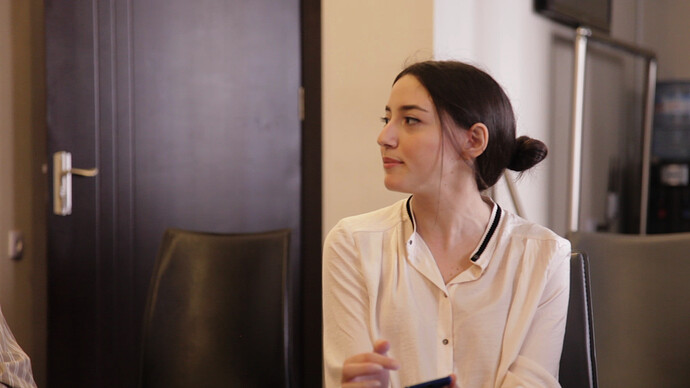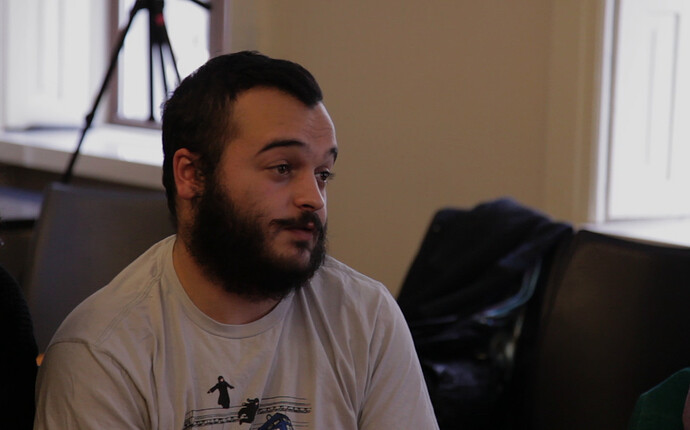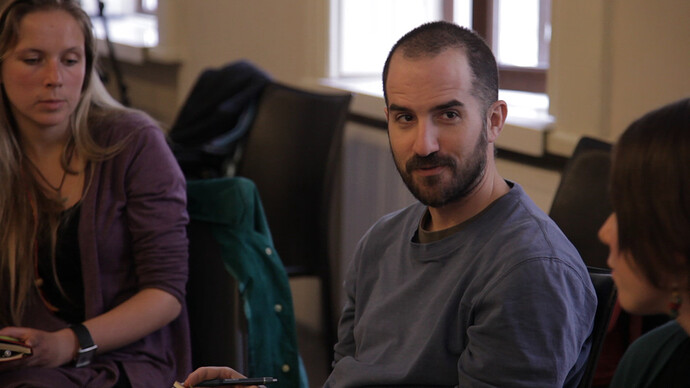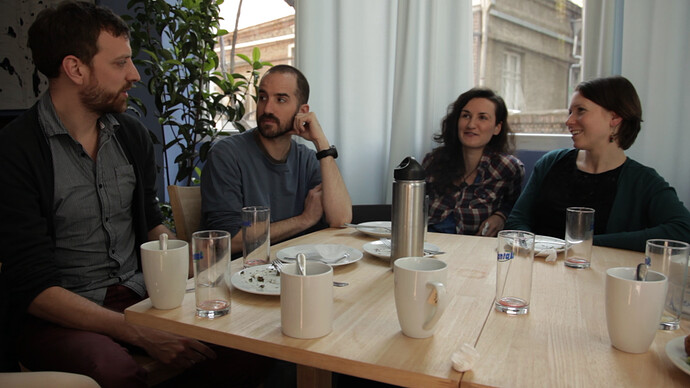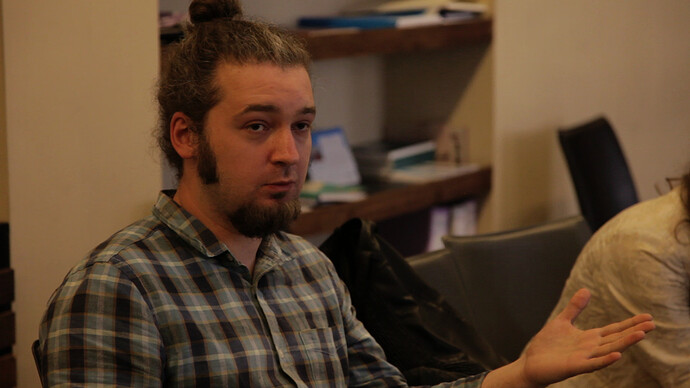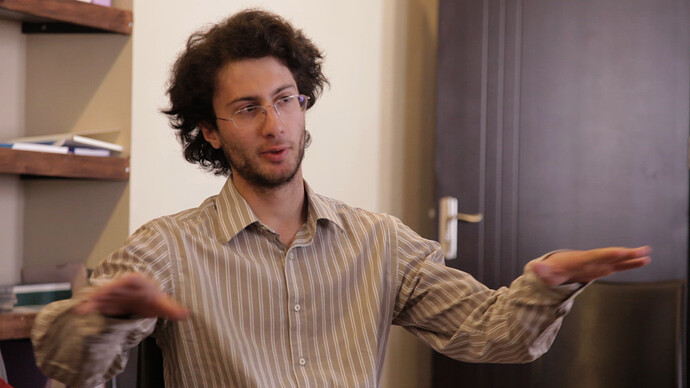Today the first day of Spot the Future Georgia Workshop took place! And it was a huge success in many different ways!
NGO activist @Cristina_Maza was so kind to tweet the following at the end of our first day:
A very inspiring @edgeryders workshop in #Tbilisi today for #Spotthefuture Thanks @NoemiSalantiu & @lingelien for organizing!
— Cristina Maza (@CrisLeeMaza)
So who are the people whom were involved today?
Ninutsa Nanitashvili: Ninutsa is a 21 year old sociology student from Tbilisi and is currently the organizer of GDG Tbilisi, a volunteer based tech organization. They are trying to bring anyone who's interested in technology together and organize several different events related to technology in one way or another. Recently they organized the conference Women Tech Makers – about women in technology. In general, Ninutsa feels that there is not enough knowledge about IT in Georgia, people have a misconseption that it's only about installing windows. "We try to make it more accessible, not only to women, but to everybody, to inspire people." GDG is not Ninutsa's first volunteering position, she's been actively involved in her community already from the age of 15, working on projects related to the environment, health, youth and just recently turned to tech side. "I want to learn coding, I am very interested in anything that has to do with the future and making our future a better place."
George (Mamaduka) Mamadashvili: Although trained in liberal arts, @Mamaduka has reinvented himself as back-end web developer. Being extremely passionate about changing the world around him, Mamaduka does not limit himself to one particular issue. He is interested in gender equality by bringing female Georgian rolemodels to stage, he gives presentations in tech related issues to youth in smaller towns around Georgia, and he is planning to create a mobile app which allows users to directly upload pictures of broken streets to the municipality: "We need to fix our streets!"
Monika Peldaviciute: Originally from Lithuania, @Monika Peldaviciute moved to Georgia in September with a very clear aim: to establish a social cultural center in an abanodned place, to start a collective movement. “I studied political science, and I was always intereste in collective action and movements, such as rainbow gatherings.” She found active people via Facebook, found an abondent building, and squatted it. They organized several cultural events and worked as community together. Suprisingly, people from all around the world came, or wanted to make donations! Unfortunately due to an internal conflict, they had to leave the Hypodrome. Currently she is actively involved in organizing events at the vake park protest .
Eric Barret: “I’m a father, and a runner, and I feel very strongly about equality in different ways”, @ericnbarrett envisions equality as open access to information, ideas and the resources to develop them. “We are a group of technologists who are trying to find creative solutions for problems through the web and design.” If you can transform ideas in interesting and understandable information, it is more accesible.
One of the biggest obstacles Eric identifies is to convince organizations to change their perceptions, to do things another way. Another obtstacle has been the highly compeitive counterproductive civil society, which refuses to work together. But it doesn’t stop Eric: “I want to see more people use the tools that are out there, to do more than they are right now, to work together on a better version which is going to benefit our future, for our children.”
Heather Yundt: As a trained journalist from Canada, @Heather Y had been always intruiged with community radio, in places such as Africa, local radio driven by community content broadcasting the needs of the communities. As a part of this she stayed in a community in Northern Canada, where there was hardly any internet connection, no cellphones, and in winter you can only go there by plane as the roads are closed; the only way people were getting information was through radio. However, Heather realizes that internet has become so widely available, that there is less need for community radio. “The open datadiscourse I find very inspiring and I would like to get more involved in this.”
Cristina Maza: Researching corruption was the reason @Cristina_Maza moved to Georgia last August, however, she soon became more interested in open data and social movements, and decided to join Jumpstart. As a freelance journalist, Cristina goal is to connect different organizations and movements with bloggers and journalists. She recruited several bloggers to write at Cafe Babel to write on pressing social issues, of which the organizations and movements are trying to work on. “Spreading information about fundamental issues to people in a good quality is what my aim is.”
Nika Davitashvili: "We're trying not politicize, we're not registered, we dont want to turn our anger into aggression" @tleilaxu_eye is one of the core people involved in the guerilla gardening movement. The organization started simply by planting trees and bushes, but became much more active in protecting green spaces. They are currently active in Vake Park and have been able to stop the building of a luxureous hotel for 3 months already, mostly through raising awareness. "If you state your reason for protesting, it will stop the demolishment, as it is often just not apparent to people what all sides of the coin are and that a simple individual can change the world."
Sandro: Sandro is an ecology student and hopes to become a biology consultant. he had a very interesting story to share, which changed his perceptions on the world: “A little while ago I was on a 2 day trip and there was one 5 year old American boy.
He wanted to go for a walk on a small hill, and I have a bad habit of smoking, so I stopped somewhere. And that is when the little boy said: don’t you think this is a place where it is too dry to smoke?” Smokey the Bear, a fictional humanlike bear with a cowboy head, had taught the boy that most of the wildfires are started due to cigarette buts. It was clear to Sandro then, that through environmental campaigns instead of commercials for casinos, change could be realistic.
Boris, David, Nita and Nino: Boris started the web-app wehelp.ge after winning a uni-hack. Wehelp.ge is a crowdsourcing transparent web app to donate money to people who are in need of medical help. “People give money to people who they want to give money to”. In order to build trust so that people would donate money, they have made the process completely transparent: you can see your donation added to a person, you can see when money is being used for medical care, and you will see the end result. With pictures, videos, all medical documentation is online. The people at wehelp.ge are all volunteers.
